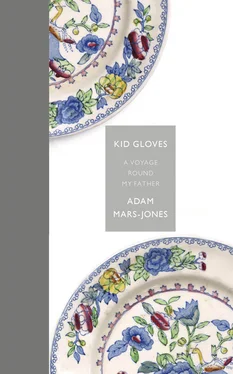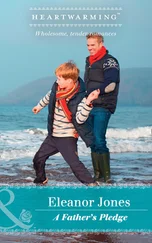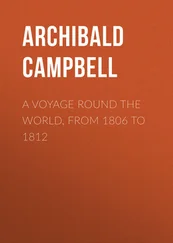I suppose it was forgiving of me to use this new-fangled legal procedure, since I had declared in the London Review of Books in the mid-1990s that marriage was too central an institution of heterosexuality, too well defended, to be made to yield even a junior mechanism for the benefit of same-sex couples. I suggested instead, following up a remark of Foucault’s, a modification of the adoption process as the most practical way of securing legal rights for loved ones. Since then a Labour administration had introduced new legislation, as if determined to show me up as a poor prophet of social developments, but there was no sense in bearing a grudge.
The dynamics between homophobic judge and publicly gay writer son, tolerating each other at least to the extent of sharing a roof, are probably not standard. I dare say each of us tried to avoid confrontation while also steeling ourselves against compromise. It was my impression that the slow, slow melting came from his side of the glaciated valley, but perhaps he would have said the same thing.
Along the way there was a series of small breakthroughs and setbacks. A timeline of sorts can be established.
Even before I left for the States in 1978, when I was still based in Cambridge, there was a postscript to the protracted New Year seaside debate about sexual identity. Dad sent me a letter in which he told me that remarkable results had been obtained from testosterone treatment on homosexuals. There were references to medical journals.
I found this fairly insulting even before I consulted the journals. The articles concerned testosterone levels rather than treatment, and the homosexuals on whom the tests had been carried out were female. I wrote Dad a curt note pointing this out, saying sourly that he should do more homework before accusing his sons of lesbianism.
The most painful thing about the episode, though, was that the references to medical journals were not in Dad’s handwriting, but his clerk John Cant’s. There had been delegation. Dad couldn’t be bothered to do his own skimpy bigoted research. I felt very let down. We’d had our difficulties in the past, but I had always been able to rely on the stamina of his prejudice, and I missed the personal touch.
Back in residence after my time in the States, I didn’t willingly expose Dad to details of my ‘private life’, but that didn’t make me culpably discreet. Sometime in late 1981 an estranged sexual partner stuck a wounding letter through the letterbox of the flat. Seeing me flinch as I opened the envelope, Dad said hoarsely, ‘Is it … blackmail?’ He was playing a very straight bat to the googlies that the queered pitch of life with a gay son was going to send his way. Even so, it wasn’t clear in his scenario quite how the proposed extortion was to be managed. Presumably the blackmailer was threatening to expose my secret life. But to whom?
Dad and I were basing our assumptions on different historical periods, or perhaps different trends in the theatre. He was giving a performance of pained dignity out of Rattigan, while I had overshot even the kitchen sink brigade, ending up on the far fringe, where the Lord Chamberlain would hardly have dared to tread. For those few hours my personal drama edged into Orton territory, black farce rather than liberal-leaning problem play.
In 1983 Dad asked me if I was responsible for editing The Penguin Book of Homosexual Verse , which had recently been published. I was offended that he could ask such a question. Wasn’t it perfectly obvious that if I took on a project of such a sort I would do it under my own name? If I did decide to use a pseudonym, I would try to do better than the name on the book’s cover, Stephen Coote.
I did on the other hand edit Mae West Is Dead that same year, an anthology of gay fiction published by Faber, providing a mildly militant introduction, and I don’t remember anything being said about that. I imagine Mum kept the peace between us to a considerable extent, and warned Dad off unsafe subjects. It was kid gloves all round, some of them elbow-length, in the debutante or drag-queen manner.
In the introduction to the anthology I made passing reference to Aids, which was just beginning to make headlines in this country, as a domestic threat rather than an exotic catastrophe. Of course I hedged my bets, in the journalistic manner, trying to come up with a politically robust statement that nevertheless wouldn’t embarrass me if a cure was found by the time the book was published — a sort of rhetorical ice sculpture designed to melt discreetly away if conditions improved.
There was no thaw. The Terrence Higgins Trust, the UK’s pioneer Aids organization, held its first meeting in 1983, at Conway Hall, just round the corner from Gray’s Inn. I wasn’t based in London at the time, since I had a little temporary post as a creative writing teacher attached to the University of East Anglia, but the event seemed important enough for me to return to London that weekend.
I don’t know what I wanted from the meeting, some sort of action plan, I suppose. There was a guest appearance by Mel Rosen, a member of the New York organization Gay Men’s Health Crisis, whose emotive style of public speaking grated on me. When he said that he had cried more in the last six months than he had in his whole life, I’m afraid I thought, so what? The link between epidemic and emotional growth seemed so tenuous and uninteresting. What were we going to do ?
Mel Rosen died in 1992, aged forty-one. I’m ashamed that I was so unresponsive when he spoke about the changes in his life. At the time the consensus was that only a small proportion of people exposed to what we assumed must be a virus (the organism was years away from being identified) would go on to develop symptoms, and that not all of those would progress to the full diagnosis, fatal in those days, but that’s no excuse. I had made a decision to be disappointed by the Trust’s lack of dynamism. Volunteering at this point would be a waste of energy. I probably wanted an excuse not to give my time to committee meetings. I was big on gestures of solidarity and points of principle (train fare from Norwich be damned), not so hot on personal involvement. I felt about Aids activism, at least in its disorganized state then, what Oscar Wilde is supposed to have said on the subject of socialism. About it taking too many evenings.
Two years of headlines and editorials eroded my sense of entitlement to distance. I volunteered to be a Buddy for the Trust, doing chores for sick men and providing a basic level of companionship. The training was rudimentary, no more than a one-day course made up of medical generalities and counselling tips. We were packed in a dark and airless room, with many of us sitting on the floor. I remember one fellow inductee seeming unable to take his eyes off my trousers, which sounds flattering until I explain that he was gazing at ankle rather than groin level. The trousers had been bought in a sale and had unfinished hems. They weren’t quite long enough to be taken up for neatness.
As if to drive home the point that Aids was not an issue I could legitimately dodge, the headquarters of the Terrence Higgins Trust at the time was in Panther House, light industrial premises with an address in Mount Pleasant but geographically closer to Gray’s Inn Road. I was the nearest volunteer by some way, in what was not much of a residential district. From my parents’ front door to the Trust’s front line was a three-minute walk.
Or a ninety-second dash in an emergency. On one occasion, there was an executive panic about what was going on with the phone line at Panther House. News was coming in that an Aids patient had tried to discharge himself from hospital against medical advice, and had been arrested to stop him leaving the premises. This was obviously an alarming precedent and there was intensive interest from the press. The Trust hadn’t had time to come up with any kind of official statement. The fear was that a volunteer whose job was only to provide basic medical advice to the worried, to refer them to more expert sources, might be reacting off the cuff from Panther House. It seemed ominous that the number had been engaged for hours.
Читать дальше












